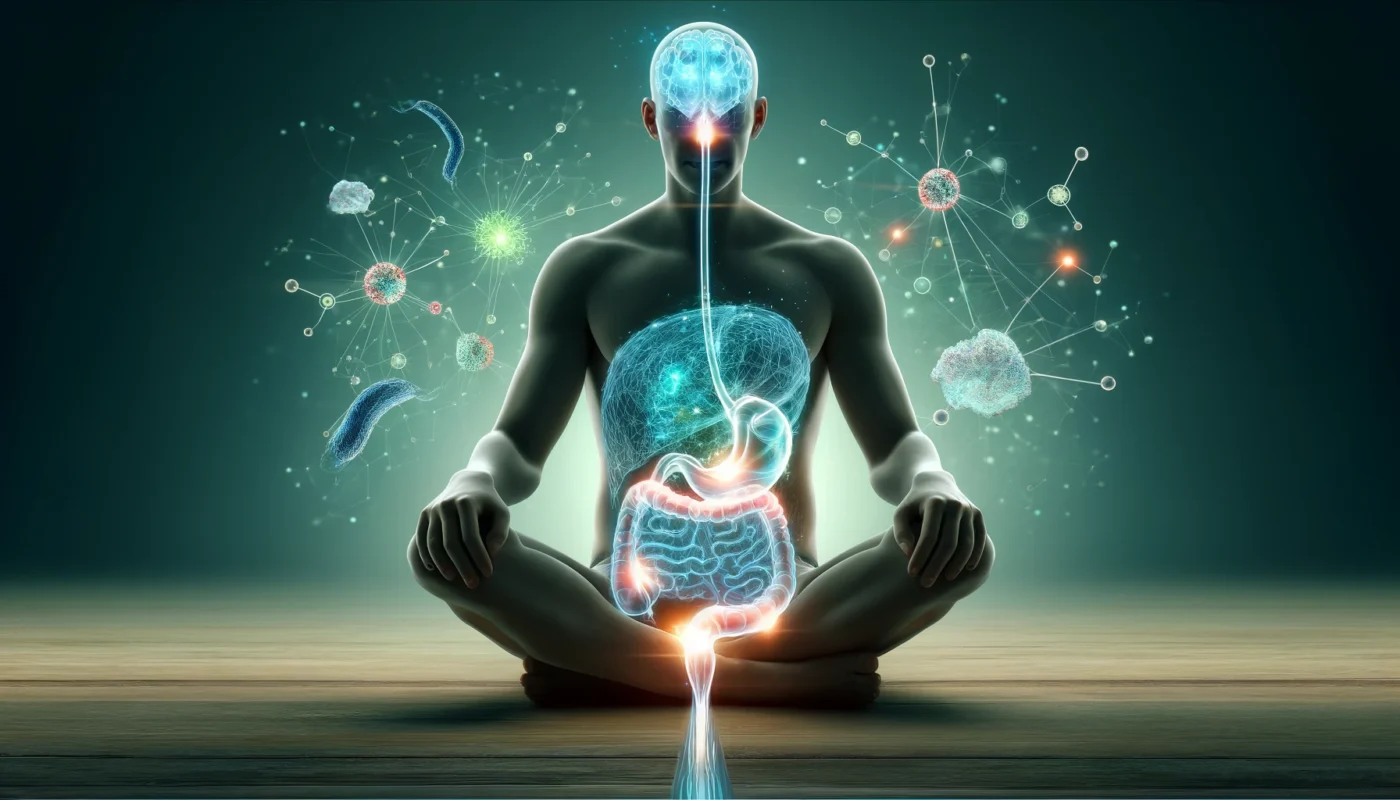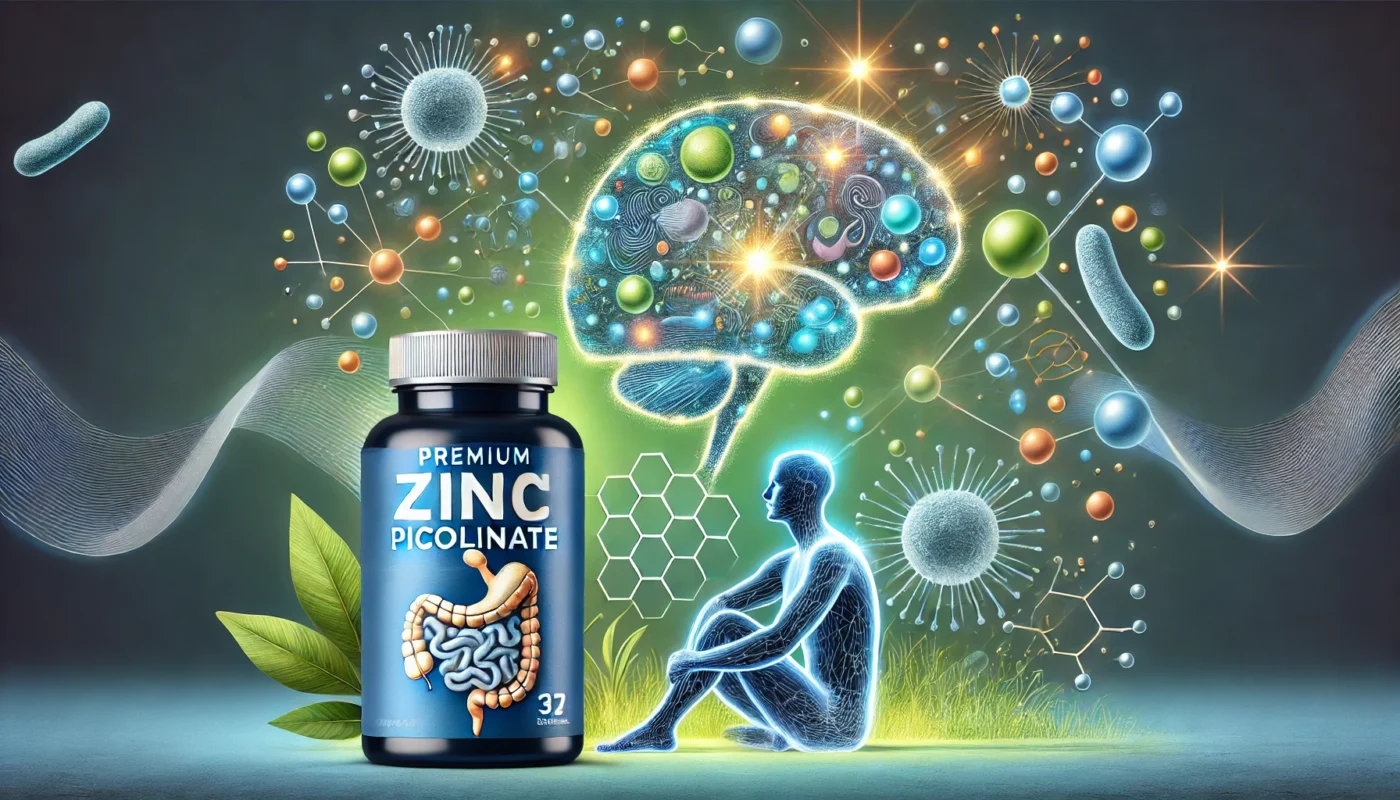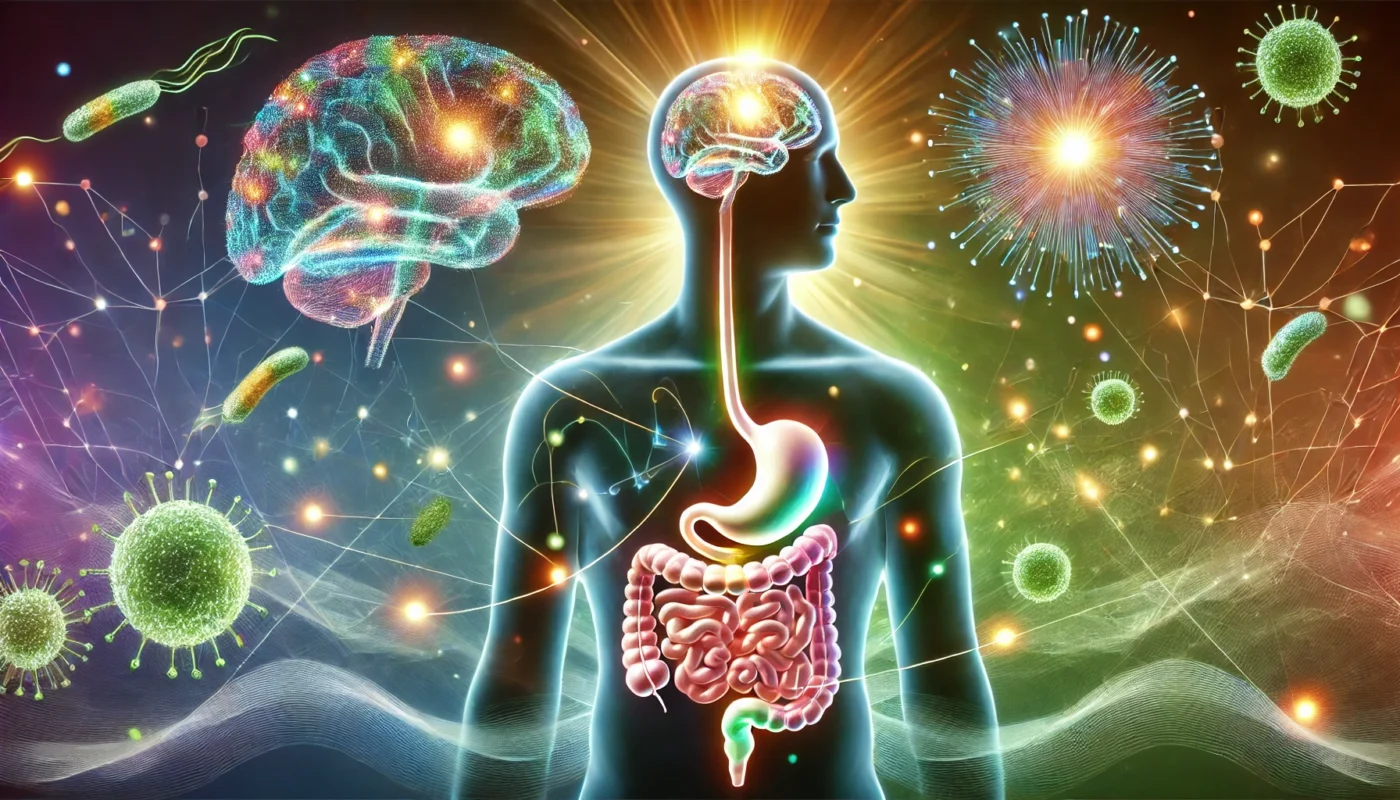The interplay between the gut and brain—known as the gut-brain axis—has emerged as a groundbreaking area of research, revealing the profound connection between digestive health and mental well-being. Central to this relationship are the microbiome, neurotransmitters, and systemic inflammation, all of which can influence mood, cognition, and overall health. One nutrient that has garnered attention for its ability to support both gut and brain health is zinc.
Zinc, an essential trace mineral, is crucial for various physiological processes, including immune regulation, neurotransmitter function, and maintaining the integrity of the gut lining. Zinc picolinate, a chelated form of zinc known for its superior bioavailability, is particularly effective in bridging the gap between digestive health and mental well-being. This article delves into the science behind zinc picolinate’s role in the gut-brain axis, exploring its mechanisms, benefits, and the evidence supporting its use.
Zinc Picolinate and Gut Health: Strengthening Your Body’s Defenses
Zinc Picolinate for Healthy Aging in the Immune System: What You Need to Know
The Science of Zinc Picolinate and Gut-Brain Health: What We Know So Far is an original (HSLHealing) article.
Understanding the Gut-Brain Axis
The gut-brain axis is a bidirectional communication network linking the central nervous system (CNS) and the gastrointestinal (GI) tract. This connection relies on:
- The Microbiome: A diverse community of bacteria in the gut that influences brain function through metabolites, immune modulation, and hormone production.
- Neurotransmitters: Chemicals like serotonin, dopamine, and gamma-aminobutyric acid (GABA), many of which are produced in the gut and regulate mood and cognition.
- The Vagus Nerve: A major nerve that transmits signals between the gut and brain, playing a key role in maintaining homeostasis.
- Systemic Inflammation: Chronic inflammation in the gut can disrupt the gut-brain axis, contributing to mental health conditions like anxiety and depression.
The Role of Zinc in Gut and Brain Health
Zinc’s influence on the gut-brain axis can be attributed to its multifaceted roles in:
- Supporting Gut Barrier Integrity:
Zinc strengthens the gut lining by promoting the production of tight junction proteins, reducing intestinal permeability (commonly referred to as “leaky gut”). - Regulating the Microbiome:
Zinc influences the composition and diversity of gut bacteria, creating an environment that supports mental well-being. - Reducing Inflammation:
Zinc modulates the immune response, decreasing the production of pro-inflammatory cytokines that can disrupt the gut-brain axis. - Facilitating Neurotransmitter Activity:
Zinc is a cofactor for enzymes involved in the production of serotonin, dopamine, and GABA, which regulate mood, motivation, and relaxation.

What Is Zinc Picolinate?
Zinc picolinate is a chelated form of zinc, where zinc is bound to picolinic acid. This structure enhances zinc’s absorption in the gastrointestinal tract, making it more bioavailable than other forms, such as zinc oxide or zinc sulfate. For individuals looking to optimize gut and brain health, zinc picolinate provides a reliable and effective solution.
How Zinc Picolinate Supports the Gut-Brain Connection
1. Strengthening the Gut Barrier
A healthy gut lining prevents harmful substances from entering the bloodstream and triggering systemic inflammation. Zinc picolinate supports the integrity of the intestinal barrier.
- Research Insight: A study in Gut found that zinc supplementation improved intestinal permeability in patients with Crohn’s disease, reducing inflammation and improving symptoms.
2. Modulating the Gut Microbiome
The balance of beneficial and harmful bacteria in the gut affects mental health, with imbalances linked to conditions such as depression and anxiety. Zinc picolinate promotes microbial diversity and reduces pathogenic bacteria.
- Study Finding: Research published in Microbiome demonstrated that zinc supplementation increased levels of beneficial bacteria like Lactobacillus and Bifidobacterium, which are associated with improved mood and cognitive function.
3. Reducing Neuroinflammation
Chronic inflammation in the gut can lead to neuroinflammation, contributing to brain fog, anxiety, and depression. Zinc picolinate inhibits pro-inflammatory cytokines like interleukin-6 (IL-6) and tumor necrosis factor-alpha (TNF-α).
- Clinical Evidence: A study in Nutrients showed that zinc supplementation reduced inflammatory markers in individuals with depression, improving symptoms and overall well-being.
4. Enhancing Neurotransmitter Function
Zinc is essential for the production and regulation of neurotransmitters. Zinc picolinate ensures adequate zinc availability for enzymes involved in neurotransmitter synthesis.
- Study Insight: Research in Journal of Affective Disorders found that zinc supplementation improved serotonin and dopamine activity, leading to reduced symptoms of anxiety and depression in participants.
5. Supporting Stress Resilience
The gut-brain axis is highly sensitive to stress, which can disrupt gut health and impair mental well-being. Zinc picolinate modulates the hypothalamic-pituitary-adrenal (HPA) axis, reducing the physiological response to stress.
- Evidence: A randomized controlled trial published in Psychiatry Research found that zinc supplementation reduced cortisol levels and improved resilience to stress in adults.

Zinc Deficiency and Its Impact on the Gut-Brain Axis
Zinc deficiency is a global concern, affecting up to 17% of the population, according to the World Health Organization (WHO). Risk factors include poor dietary intake, malabsorption disorders, and chronic illnesses.
Consequences of Zinc Deficiency:
- Increased intestinal permeability, leading to inflammation.
- Imbalanced gut microbiome, favoring pathogenic bacteria.
- Reduced production of serotonin and dopamine, contributing to mood disorders.
- Heightened susceptibility to stress and anxiety.
Statistics:
- A study in Clinical Nutrition found that individuals with depression were 30% more likely to be zinc-deficient compared to healthy controls.
Clinical Studies Supporting Zinc for Gut-Brain Health
- Zinc and Gut Integrity (2017):
A study in Gut found that zinc supplementation improved gut barrier function in patients with inflammatory bowel disease (IBD), reducing symptoms and systemic inflammation. - Zinc and Depression (2016):
Research in Journal of Affective Disorders showed that zinc supplementation significantly reduced depressive symptoms in individuals with treatment-resistant depression. - Zinc and Microbiome Diversity (2019):
A study in Microbiome demonstrated that zinc supplementation increased microbial diversity and reduced markers of gut dysbiosis in individuals with anxiety disorders. - Zinc and Stress Resilience (2020):
A clinical trial published in Psychiatry Research found that zinc supplementation lowered cortisol levels and improved stress resilience in healthy adults.
Dietary Sources of Zinc for Gut-Brain Health
While supplementation with zinc picolinate is effective, incorporating zinc-rich foods into your diet can also support gut and brain health. Examples include:
- Animal-Based Sources: Oysters, beef, chicken, and eggs.
- Plant-Based Sources: Pumpkin seeds, lentils, chickpeas, and fortified cereals.
For individuals with dietary restrictions or increased zinc needs, zinc picolinate offers a reliable alternative to ensure adequate intake.
Recommended Dosage and Safety
The recommended dietary allowance (RDA) for zinc varies by age and gender:
- Adult men: 11 mg/day
- Adult women: 8 mg/day
For therapeutic purposes, doses of zinc picolinate between 15–30 mg/day are commonly used. However, excessive zinc intake (above 40 mg/day) can cause:
- Nausea and gastrointestinal discomfort
- Reduced copper absorption, potentially leading to deficiencies
Note: Always consult a healthcare provider before starting supplementation to ensure proper dosage and safety.

How to Incorporate Zinc Picolinate into a Gut-Brain Health Plan
- Combine with Probiotics:
Pair zinc picolinate with probiotic-rich foods or supplements to enhance microbiome diversity and gut health. - Adopt a Balanced Diet:
Include anti-inflammatory foods such as fatty fish, leafy greens, and berries to support the gut-brain axis. - Practice Stress Management:
Incorporate mindfulness practices like meditation or yoga to reduce stress and its impact on gut health. - Monitor Progress:
Track changes in mood, digestion, and overall well-being to evaluate the effectiveness of supplementation.
Future Research Directions
While significant progress has been made, further research is needed to explore:
- The long-term effects of zinc picolinate supplementation on gut-brain disorders.
- Synergistic interactions between zinc and other gut-brain nutrients, such as magnesium and omega-3 fatty acids.
- Zinc’s impact on specific conditions like autism spectrum disorders and Alzheimer’s disease, which involve gut-brain interactions.
Conclusion: Bridging Gut and Brain Health with Zinc Picolinate
Zinc picolinate offers a scientifically supported approach to enhancing the gut-brain axis. By strengthening the gut barrier, modulating the microbiome, reducing inflammation, and supporting neurotransmitter function, zinc picolinate addresses key factors linking digestive health and mental well-being.
For individuals seeking to optimize their gut-brain connection and improve overall health, zinc picolinate is a valuable addition to a balanced nutrition and wellness plan. As always, consult with a healthcare provider to tailor supplementation to your specific needs and ensure safe and effective use.

References
- Zinc Deficiency and Immune Dysfunction. The Lancet. Retrieved from: https://pubmed.ncbi.nlm.nih.gov/2200472/
- Gut Microbiota Modulation as a Novel Therapeutic Strategy in Cardiometabolic Diseases. Retrieved from: https://pmc.ncbi.nlm.nih.gov/articles/PMC9455664/
- Zinc and gastrointestinal disease. Retrieved from: https://pmc.ncbi.nlm.nih.gov/articles/PMC4231515/
- Zinc in Cognitive Impairment and Aging. Retrieved from: https://pmc.ncbi.nlm.nih.gov/articles/PMC9312494/
- Molecular Mechanisms of Zinc as a Pro-Antioxidant Mediator: Clinical Therapeutic Implications. Retrieved from: https://pmc.ncbi.nlm.nih.gov/articles/PMC6617024/
- Effects of zinc supplementation on cognitive function in healthy middle-aged and older adults: the ZENITH study. Retrieved from: https://pubmed.ncbi.nlm.nih.gov/17010236/
Important Note: The information contained in this article is for general informational purposes only, and should not be construed as health or medical advice, nor is it intended to diagnose, prevent, treat, or cure any disease or health condition. Before embarking on any diet, fitness regimen, or program of nutritional supplementation, it is advisable to consult your healthcare professional in order to determine its safety and probable efficacy in terms of your individual state of health.
Regarding Nutritional Supplements Or Other Non-Prescription Health Products: If any nutritional supplements or other non-prescription health products are mentioned in the foregoing article, any claims or statements made about them have not been evaluated by the U.S. Food and Drug Administration, and such nutritional supplements or other health products are not intended to diagnose, treat, cure, or prevent any disease.

